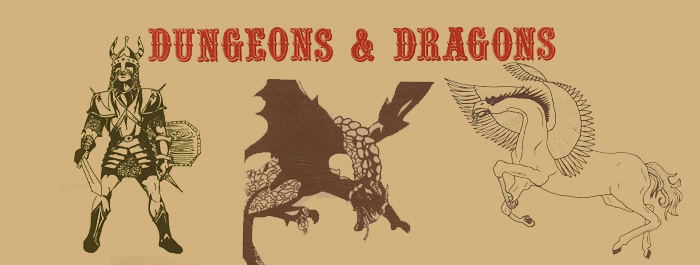If you’re interested in game design chances are this isn’t the first time you’ve heard of Dungeons & Dragons (D&D for short) or pen and paper roleplaying games, but you may not know the important role that they play in the history of game development and design that makes them relevant to the games industry today.
Way, way back, in a mythical era, called the seventies, two guys, Dave Arneson and Gary Gygax, played a miniature wargame called, Chainmail, with supplemental rules for a fantasy setting created by Arneson. The game took place in Gygax’s basement and when it was over the two began collaboration on the world’s first pen and paper roleplaying game: Dungeons & Dragons.


In case you’re not familiar with the terminology pen & paper games are games that do not require a specific board or game pieces with the exception of various dice. You can use other objects such as game boards and miniature figures if you wish, but they are not needed.
D&D itself is a pen & paper roleplaying game, in which players create a character of various races and classes that represent them in the game. Players then use these characters to interact with a world (usually of the fantasy genre) created by a DM or Dungeon Master. The game itself provides rules or systems for how players can interact with the game’s world and whether or not their attempted actions fail or succeed. In short, the rules govern the chance of success of any action based on stats assigned to the player’s characters.

If this system seems familiar to those you find in roleplaying games it’s because D&D’s systems were the inspiration for a ton of different video games. Modern game series like Dragon Age or Pillars of Eternity pull heavily from these systems and other games pull individual mechanics out of this system and use them in their games.
Here are just a few:
CHARACTER CREATION
Assigning attributes point, skills point, having feats or abilities, these mechanics found in many roleplaying games and even some non-roleplaying games all stem from D&D originally. Even the concept of having a class that outlines your characters abilities or being able to play as various races that appear in literary works of Fantasy such as, J.R.R.Tolkein’s, Lord of the Rings.

COMBAT

In the mid 90’s to early 2000’s Wizard’s of the Coast, D&D’s publisher, worked with video game developers to make games that were a direct port of D&D’s mechanics and rules.
Modern games still, to this day, often utilize various elements from D&D’s combat mechanics. Whenever you see combat damage as an integer greater than one number and lesser than another you can thank D&D and the use of dice rolls to determine varying factors such as damage or a character’s chance to hit. Any time you see the term “critical hit” or critical damage you can thank D&D’s critical hit mechanic that grants players bonus damage for rolling a ’20’ on a 20-sided die. The idea of “leveling up” comes from D&D too. Players gather experience points as they interact with the world and gain more experiences. Once a player has enough points they “level up” and are able to increase varying stats and abilities of their character.
STORY / NARRATIVE
D&D was one of the first games to feature branching narrative or multiple narrative paths. Not only can DM’s plan for branching narrative and construct it before players sit down for a session, but DM’s can change the story on the fly based off of player’s choices creating a fluid and believable world.
This is one category in which D&D has a strong competitive edge and one of the reasons I believe it is still so popular today. D&D’s open systems and rules allow for unprecedented freedom in the choices of its players and allows them to truly play a role in shaping the story versus choosing between ‘Choice A’ and ‘Choice B’ as we do in so many other games today.
These are just a few of the ways D&D has played a role in shaping the modern game industry and without it I believe the games we play today would be radically different. So, next time you land a critical hit in World of Warcraft, create a new character in Destiny, level up in Skyrim, or choose between several different dialogue options in Mass Effect remember the game that pave the way for it all: D&D.

